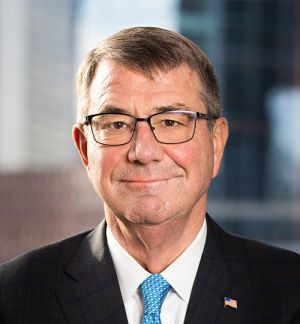
Following President Trump’s decision to withdraw troops from northern Syria, Belfer Center experts discussed the impact on America, its allies and adversaries, and the region.
Nicholas Burns, Roy and Barbara Goodman Family Professor of the Practice of Diplomacy and International Relations: “President Trump’s disastrous decision to retreat from the U.S. position in Syria will diminish America's credibility with allies and friends around the world. Trump has already earned a global reputation for unreliability. He is viewed as a leader without core convictions with no lasting allegiances to our allies and partners such as the Syrian Kurds. Trump’s folly will lead to renewed fighting in northern Syria and will expose the Syrian Kurd population to direct attacks by the Turkish armed forces. Who will gain from Trump’s decision? Russia, Iran, Hezbollah, the Assad government and a Turkish President who has proven himself to be America’s most difficult NATO ally. Trump overruled the State and Defense Departments and experts throughout our country in reversing a successful American policy of many years. This is one more example that he is unfit to lead.”
Ash Carter, Director, Belfer Center for Science and International Affairs: “Recall that in 2015 ISIS used its so-called capital in Raqqa to plot and inspire shootings, bombings, decapitations, and running over people in the streets in America and Europe. I was Secretary of Defense, and with the Chairman of the Joint Chiefs and the CENTCOM Commander, we devised the American-led campaign to destroy ISIS’s state and take Raqqa. The campaign used Syrian Kurdish infantry supercharged with American and coalition firepower, intelligence, advising, and logistics. U.S. losses were far less than if we had used a large, American ground force. By the time President Trump took office, victory was assured and he permitted the campaign’s final stages to proceed to victory. Now victory is inexplicably surrendered. ISIS will return to threaten our people. Only next time we will have to destroy the enemy on our own.”
John Holland-McCowan, Research Fellow, International Security Program: “A U.S. withdrawal from Syria risks irreparably undermining the Syrian Democratic Forces (SDF) - the U.S-led coalition’s principal ally against ISIS. Even a limited withdrawal of coalition forces from key positions in Northeastern Syria provides strategic openings that both Ankara and Damascus can dangerously exploit to further destabilize the region. ISIS’s potent underground insurgency will take advantage of the ensuing power vacuum to gain renewed strength. Finally, a U.S. withdrawal forfeits most of the leverage the U.S. and our allies have in the Syrian civil war as it enters a crucial, uncertain period.”
Morgan L. Kaplan, Executive Editor, Quarterly Journal: International Security: “The White House’s abrupt pullback from Syria’s northern border and Turkey’s subsequent incursion is a hugely destabilizing development for the region and a painful blow to America’s local Kurdish partners. In addition to the immediate bloodshed, the ramifications will be more distrust of America as a security partner and greater opportunity for the Islamic State to recuperate. However, this is not a change in trajectory for America’s reputation or regional security politics – these events have catalyzed existing trends. Furthermore, we are reminded that the predictability and process of decision-making is just as important for stable policy outcomes as the decisions themselves.”
Rami Khouri, Senior Fellow, Middle East Initiative: “If the U.S. does retreat from northern Syria and redeploy its modest troops contingent elsewhere in the country, this would dramatically reinforce the ‘America first’ message that has defined Trump’s presidency. Allies and opponents in the Mideast would see the U.S. under Trump as a fickle and selfish partner that understands few political, ethnic, and nationalist realities in the region, and also sacrifices short-term allies for its own longer-term relationships with bigger powers. This loss of credibility and trust will take years to correct.”
Eric Rosenbach, Co-Director, Belfer Center for Science and International Affairs: “Only Donald Trump could make such a capricious decision that so clearly undermines key U.S. national interests. This decision will: 1) increase the likelihood of an ISIS-planned terrorist attack on America; 2) embolden a Turkish autocrat with a half-baked plan that will likely result in the deaths of thousands of innocent civilians, and; 3) rupture a delicate balance of power in a region that could suffer from widespread conflict in the coming weeks.”
Wendy R. Sherman, Senior Fellow, Belfer Center for Science and International Affairs: “The President…has put the United States on the side of a genocide that is likely to take place in the days ahead…..What [President Trump] has done is greenlighted Turkey and greenlighted Russia and really given a present to Vladimir Putin who is trying to get a foothold in the Middle East.” (MSNBC, October 9, 2019)
Liz Sherwood-Randall, Senior Fellow, Belfer Center for Science and International Affairs: “Trump’s withdrawal of forces from Syria, coupled with his utterances on the utility of European allies, will have multiple negative consequences for America’s security and ability to lead the world. First, it will increase regional instability and return space to ISIS, which the U.S. previously invested heavily in countering, reducing its territory and limiting its further spread. Second, it abandons Kurds who have been close security partners and fought ably alongside U.S. forces, undermining U.S. credibility. Third, it creates new risks of terrorist metastasis, putting the homeland in danger. Despite Trump’s absurd comment that the release of ISIS prisoners will only threaten Europe — as if Europe’s security doesn’t matter to us — we know Europe can be used as a springboard for attacks on the United States. Fourth, it alienates our allies and reduces our influence: friends are bewildered and adversaries exploit the opportunity. Congress should block the President’s irresponsible behavior and prevent him from doing more harm.”
Amanda Sloat, Fellow, Project on Europe and the Transatlantic Relationship: “Trump’s hasty decision to withdraw U.S. advisers from the Syrian border, and at least tacitly approve a Turkish military operation, was sloppy and cruel. The lack of a coherent policy process and garbled messaging made a dangerous situation even worse. Renewed fighting will harm civilians in a now peaceful part of a war-torn country, enable the Islamic State to regroup, and empower Russia and Iran, who are backing the Assad regime and hungry for more influence. Ending the alliance with the YPG may be inevitable, but Trump’s critics are right that the United States can’t simply walk away without tarnishing its reputation as a reliable partner.” (The Washington Post, October 9, 2019)
Stephen M. Walt, Robert and Renée Belfer Professor of International Affairs: “Alliances are means to an end—not an end in themselves—and the tactical alliance between the United States and the Syrian Kurdish militias was based first and foremost on our mutual interest in defeating ISIS. Given America’s broader strategic interests and the need to focus on other problems, our commitment to the Kurds was on borrowed time once ISIS no longer posed any significant threat to the United States. In this sense, Trump’s desire to bring the U.S. commitment in Syria to an end was correct.
But as usual, Trump has pursued that sensible goal in the worst possible way. His impulsive decision to give Turkey a green light to attack the Kurds—a decision made with little advance planning or consultation—will raise new doubts about U.S. judgment. Moreover, the United States still has boots on the ground in Syria, but much less diplomatic leverage now that they have left the border areas. And what diplomatic concessions did Trump gain from this sudden move? Nary a one. Once again, the self-proclaimed master of ‘the art of the deal’ has shown himself to be far more adept at the art of the ‘give-away.’ ”
Carter, Ash, Nicholas Burns, Rami Khouri, Elizabeth D. Sherwood-Randall, Morgan L. Kaplan, Stephen M. Walt, John Holland-McCowan, Dr. Amanda Sloat, Ambassador Wendy R. Sherman and Eric Rosenbach. “Impacts of U.S. Troop Withdrawal from Syria.” Belfer Center for Science and International Affairs, October 10, 2019






















